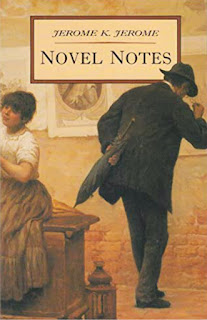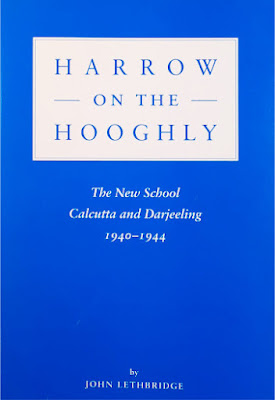Novel Notes, by Jerome K. Jerome
Jerome K. Jerome wrote one famous book, Three Men in a Boat, still very readable (and highly entertaining) today, and likely to remain so for some time yet. It created a much imitated formula for comic narratives based on the farcical adventures of three foolish men. The realisation that this formula could be applied anywhere transformed the BBC's Top Gear from a worthy but slightly dull and definitely niche motoring programme into one of the most watched general entertainment shows on the planet.
There are four rather than three foolish men in Jerome's Novel Notes. And while there are any number of interesting occasional characters, notably the unnamed narrator's wife Ethelberta, and their marvellously nonplussed and unimpressed maidservant Amenda (is that a historical spelling of Amanda?), they don't partake in any picaresque adventures. No, they assemble, regularly at first, and then more and more infrequently, in order to write a great novel. They are convinced, on the basis of a belief that between them they ought to be able to produce something of consequence (they have clearly never read any of Jerome K. Jerome's books). No, four heads are not better than one, when it comes to novel writing.
The narrative is actually a flashback: the narrator discovers an old notebook recording their meetings many years before, and sets about going through it, wondering why they never succeeded. This seems unlikely; one imagines the memories would flood back. Anyway, this structure helps to make the early enthusiasm more convincing. Each time they meet they get out their pipes and tobacco, locate some brandy or similar, and discuss all sorts of issues such as the nature of a hero, or the heroine, and the villain. If they're even necessary. The respective natures of the four makes agreement impossible on any topic, and the old notebook peters out without anything having been written. These scenes are nicely written. In all sorts of simple but telling details, we understand and appreciate the smoky atmosphere of these late evening meetings. Choice of chairs, how they sit in them, the attention given to smoking and alcoholic comforts, so much there to demonstrate to us why they never achieve anything.
This might seem a little dry compared with Three Men in a Boat, but there's a good measure of humour in the characterisations. My guess is that Jerome knows his audience expects this kind of thing, but what he's on about isn't really a repeat of those earlier adventures. The thing is, he wasn't at all impressed with the conventions of the Nineteenth Century novel, and this book goes some way to exposing their nonsense, as he saw it, without simply preaching to us. No, this really isn't his equivalent of E.M. Forster's Aspects of the Novel. It's more of an anti-novel, dedicated to suggesting to us that despite its pretensions Literature (with a capital L) is no more successful in describing the reality of life than any other genre. As each of the four (they each have a different stance on what is good and what is bad about contemporary novels) says their piece Jerome deals with what literature can do, often quite subtly. One section I liked follows a discussion of dreams; the narrator experiences a succession of strange dreams and attempts to derive insight from them, in the process showing that they don't mean anything, and are useless in offering inspiration for narrative. I think, at one remove, he's showing us that in structuring a tale at all, an author has to deviate from the experience of real life.
Just by the way, I gather that he had similar axes to grind regarding contemporary theatre, but I haven't yet read any of his critiques or the 'plays' he wrote in pursuance of that.
Novel Notes is the fourth of Jerome's books which I've read. I'll probably read more, because despite having not aged well in various respects, his writing reveals a sharp and very witty mind. I should have said more about his four characters, they're recognisable and manage to come to life even though they're being used as mouthpieces for various points of view. He describes human nature in all its vanities, selfishness and foibles, and yet offers us some warmth in our humility. It's not that some people don't deserve despising, but occasionally we can forgive, and smile, and ask 'Does any of it really matter?'
I'd better add, I definitely benefited from borrowing this particular edition (from Alan Sutton Publishing, see in the thumbnail above), because it's graced with plenty of evocative pen and ink illustration. Gentlemen, ladies, dogs and cats. Oh yes, cats.




I hadnt heard of this book, but loved Three men in a boat ....and Three men on a bummell(?), but couldnt quite cope with "The passing of the third floor buck".
ReplyDeleteFor a whole year i had the boat one in my desk at school, and as we had a very violent (and lazy) english teacher, we had to spend one (or maybe two lessons) a week reading.
Looking up from the page could get you a clout so I know the book pretty much off by heart. I appreciated both the humour and the "nature and history" notes that told of an older England. Will make a beeline for this volume now I know of its existence.
And there you have some of the reason why having to study literature can kill off one's love of it. Mine suffered for ages, even though I have to be grateful that I was introduced to much that I would never have thought to read otherwise.
DeleteI enjoyed Jerome's singular way of dealing with the pretentiousness of authors and novel writing. But I'm cautious about recommending it. It does lack the adventure of the Three Men books. For that kind of fun, I'd suggest something like Notes on a Pilgrimage, much more than this. Due warning, that there are plenty of rude remarks about Germans in it. Almost as many as Jerome typically throws at British people.